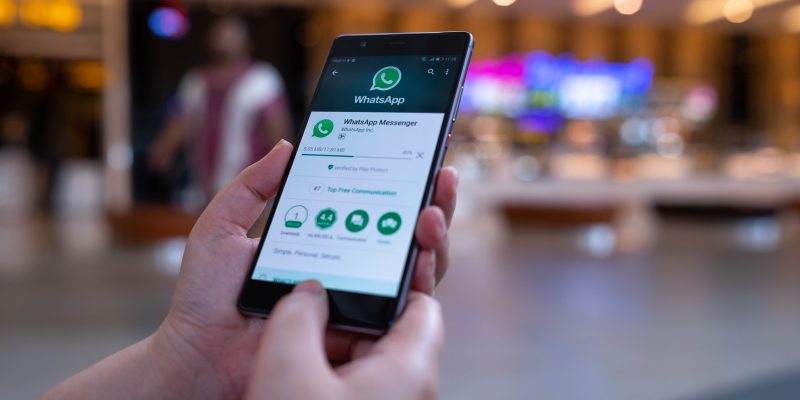Following a public backlash against updates to its privacy policy, WhatsApp is launching its first worldwide advertising campaign. The “Message Privately” campaign focuses on WhatsApp’s end-to-end encryption and seeks to reassure users that their communications can’t be read by anyone, including parent company Facebook.
WhatsApp Privacy Update
WhatsApp had a rocky start to the year when it attempted to roll out updates to its privacy policy and terms of service in January. Facebook plans to further monetize the app by letting businesses contact their clients and customers through WhatsApp, paving the way for targeted advertising and e-commerce.
While changes largely concern data sharing through business communication for WhatsApp, the updates brought plenty of confusion regarding users’ privacy. Many users thought they were giving Facebook and Facebook subsidiaries access to their private messages and communication. Following a backlash on social media, many users believed they needed to agree to controversial changes by Feb. 8, or lose access to the app. WhatsApp experienced a mass exodus as users flocked to rivals like Signal and Telegraph.
WhatsApp delayed the update until May 15 to avoid further confusion and misinformation. This gave users more time to digest changes to the privacy policy.
WhatsApp Launches Privacy Campaign
The “Message Privately” campaign kicked off Monday in two of WhatsApp’s largest markets, the U.K. and Germany. The campaign looks to showcase WhatsApp’s end-to-end encryption to its nearly 2 billion users worldwide. WhatsApp uses end-to-end encryption on its messaging, meaning only the devices that send and receive the messages can read them. So WhatsApp, Facebook, and even law enforcement are unable to read or access private communication.
So far, the campaign has released a video of a couple mysteriously meeting up at a double dinner date after exchanging messages on WhatsApp. The ad ends with the text: “What brought them together, with end-to-end encryption, only they know.”
WhatsApp’s Twitter feed also began lighting up yesterday. “WhatsApp is built to protect your private messages with end-to-end encryption. So only the people you’ve messaged can read or listen to your conversation,” the company said in a tweet. “This means that nobody else, not even WhatsApp, has access to your conversations. End-to-end encryption locks your messages. You and your recipients have a unique key that allows you to chat privately.”
While the campaign reinforces WhatsApp’s confidence in its encryption methods, critics say end-to-end encryption encourages the distribution of illegal material. In 2020, WhatsApp reported 300,000 images to the National Center for Missing and Exploited Children. WhatsApp has also reported that they ban about two million accounts per month for violating terms of use.
What are the Updates to WhatsApp’s Privacy Policy?
EU users will see no change due to General Data Protection Regulation (GDPR), but most of the updates affecting non-EU WhatsApp users involve data sharing with Facebook and Facebook companies. This will give businesses more opportunities to target customers.
Data Sharing with Facebook Companies
If non-EU WhatsApp users want to keep using the app, they’ll have to share information with Facebook and Facebook subsidiaries. According to WhatsApp, your information will only be shared when using WhatsApp to contact businesses. Some companies will be using Facebook to host and organize their messaging with customers, and data sharing will be used to drive targeted advertising.
But what kind of information is being shared?
Personal information
Personal information such as names and phone numbers will be shared with Facebook and its subsidiaries. Though WhatsApp says it won’t give out phone numbers to businesses.
WhatsApp contacts
If users give WhatsApp consent, their contacts and information about how they interact with their contacts can be shared. Specific message details are not shareable.
Technical information
Users’ IP addresses, device model numbers, operating systems, and network carriers could also be shared.
Payment and delivery information
Users that make payments through WhatsApp could have their transactional information and shipping addresses shared.
What Stays the Same After WhatsApp Privacy Updates?
Below is what will stay the same after the updates:
- Private messages will still be encrypted, so neither WhatsApp nor Facebook can read them.
- WhatsApp and Facebook still can’t see the content of your messages and calls.
- WhatsApp keeps no logs of messages or calls.
- WhatsApp and Facebook cannot see your shared location.
- WhatsApp won’t share your contacts with Facebook unless you give consent.
- WhatsApp group chats will still be private.
- WhatsApp won’t give your phone number out to businesses.
You can read about all of these guarantees in more detail on WhatsApp’s website.
Taking Control of Privacy Online
If you’re a WhatsApp user and are looking to protect your online privacy, there are several steps you can take. First, you may want to adjust your Facebook and Instagram privacy settings. Then make sure to check your WhatsApp. We provide a step-by-step guide to adjusting WhatsApp privacy settings here. If you’re looking to use another messenger, we compiled a list of the safest alternatives in this article.
Also, consider the security and anonymity a Virtual Private Network (VPN) provides. This puts a buffer between you and the services you use online to protect your privacy. These are our top five VPN providers.

